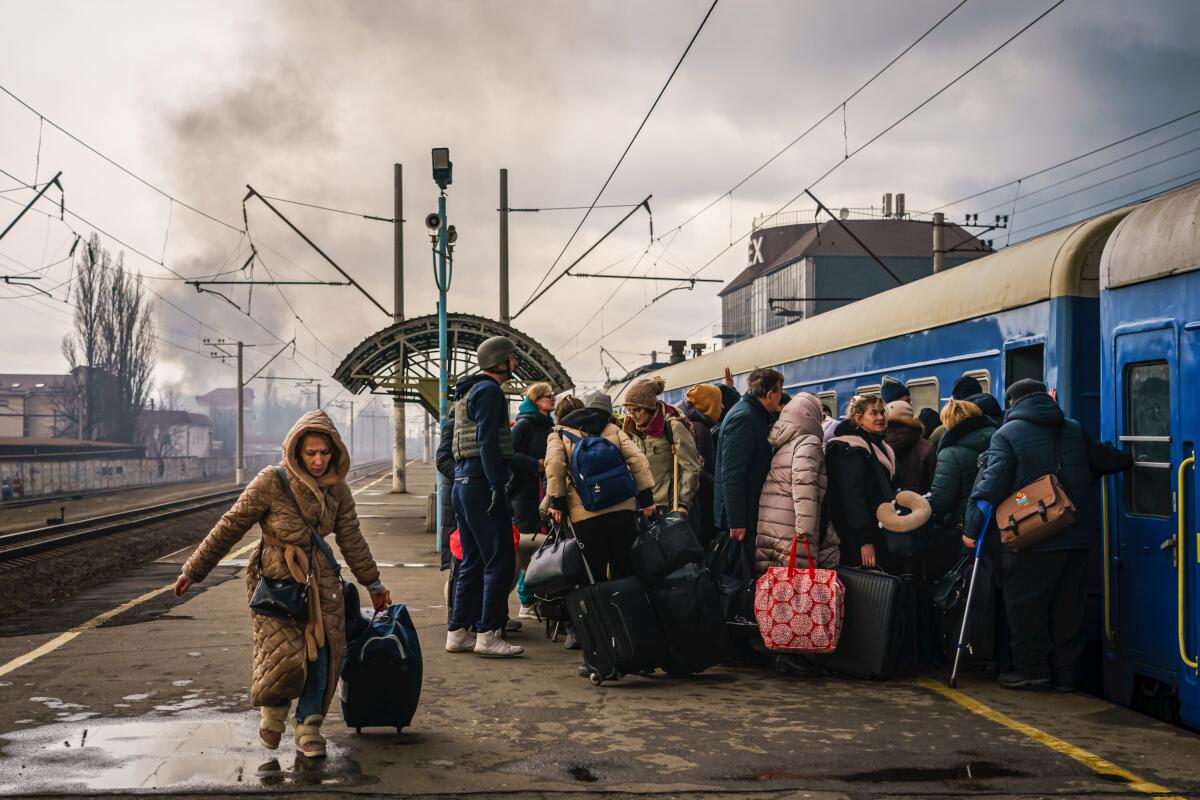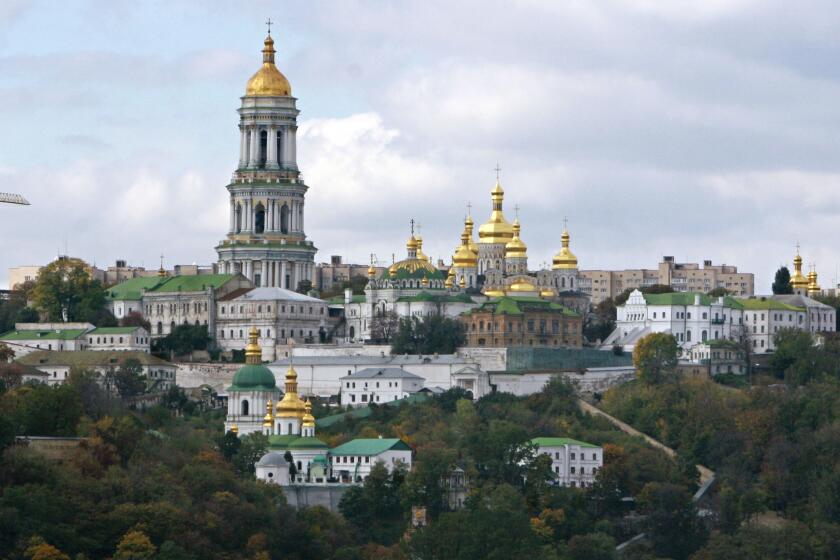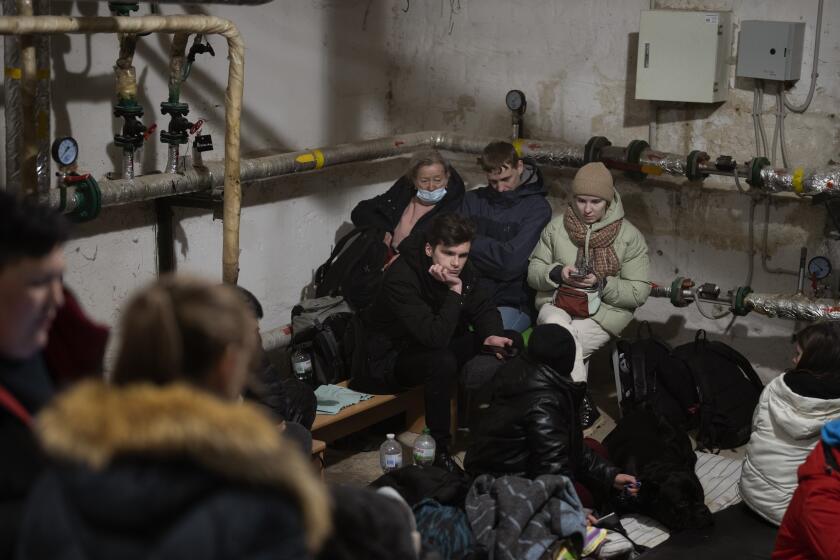I can’t stop thinking about the Ukrainians I once knew, and the ones I never met

- Share via
The faces of three people I left behind in Ukraine are haunting me. I think about them and little else.
I met them when my wife and I lived in Kyiv from late 2016 to October of 2018. My wife was a Foreign Service officer, posted to the U.S. Embassy. I was, as is known in the service, an EFM, or eligible family member. I was proud to be a part of the mission family.
One person was a cook. She didn’t often make meals for us, just when we hosted dinners for friends who worked in the embassy. A week in advance, I would tell her what we would like to serve, and she would deliver a feast every time, usually starting with the most delicious bruschetta I’ve ever had. A few days before we left Ukraine, she told us via email how grateful she was for the work:
“Thank you so much you trusted me. Good luck at your homeland. It’s sooo sorry to lose you. I’m happy to have met you both in Kyiv.”
Another was our hairstylist. She spoke Russian with my wife, but there was no chance of that with me. Her English wasn’t great, though it was good enough that we could communicate. Our running joke was whether I would let her take the gray out of my hair. Next time, I kept telling her, next time. She laughed. So did we.
On the day of our last appointment, she cried. So did we.
The third person worked at the embassy. Accustomed to newly arrived Americans, he gave us advice on navigating the city and patiently explained how to pay for internet and cellphone access. Without him, I really would have been lost.
These three Ukrainians weren’t our close friends. When my wife’s tour ended, I never expected to see them again. Now I wish I could see them one more time. To know they are safe. To know they will still have a country when this insanity comes to an end.
I also think about all the Ukrainians I never met, the ones I saw around the Maidan, the square in Kyiv where peaceful protests staged in late 2013 and early 2014 became known as the Revolution of Dignity.
On my walks to the Maidan, I often stopped to look at the photos of the “Heavenly Hundred,” those who sacrificed their lives after Viktor Yanukovych, then president of Ukraine, turned the police against his own people. All they wanted was for their nation to have closer ties to Europe. Because of their tremendous courage, Yanukovych was forced to flee. Watch the 2015 documentary “Winter on Fire” (now free on YouTube), and you’ll better understand why Ukrainians fight so hard for their freedom.
Ukraine’s resistance to Putin’s invasion continues a multigenerational drive for self-determination against Russian supremacists.
I feel guilty telling friends how deeply the war has affected me. I live in the United States of America. A few weeks ago, I played golf at one of my favorite courses and lunched near Santa Barbara. My house isn’t being shelled. So precisely what ordeal could I be experiencing?
Yet I’m devastated and angry. Angry with anyone who isn’t as obsessed with the Russian invasion as I am. That includes the media. The moment any network has the audacity to switch to covering another news story, I switch channels. There is no other story. Not now.
Living in Kyiv for almost two years isn’t the only reason I feel this strongly.
I have a deep personal connection. My grandparents grew up in Skvyra, a city in central Ukraine, although it was then part of Russia. My mother was born in Kyiv in 1922. I’ve never known much about their life there. They didn’t talk about the “old country.” They were Americans now.
What I do know is gleaned from about 20 pages my mom typed up when she was 15 years old. I looked at them once years ago, but what her family must have endured didn’t really sink in. Until now. I knew the document was somewhere in the garage. I was fortunate to find it. The date on the final page: April 10, 1938. She referred to the document as her “auto-biography”:
“After the Russian Revolution when the nationalist spirit arose, my grandfather lost his property. … We left Russia (in a haste) when I was seven months old. Democracy was what my father desired, and democracy was just what was lacking in Russia. From Russia we went to Rumania where we stayed until 1923. In 1923 we left for the land that is a haven for immigrants, political refugees, and the unjustly oppressed — America. … We docked at New York City on September 1.”
No wonder those days rarely came up.
At 7, I became a refugee from Hungary. Photos from Ukraine have made painful memories resurface and my heart ache for the country’s refugee children.
I’m no longer watching the news like I did during the first days of the assault. I become too enraged — at what Russia is doing and at what the United States, the most powerful country in the world, is not.
One day, I hope, I will be in touch again with the three people I can’t get out of my mind.
And next time, I really will allow my hairstylist to take the gray out.
Growing up in Albany, N.Y., I never felt the least bit Ukrainian. Nor had I felt any profound emotional attachment to the old country since, even when I lived there.
I feel Ukrainian now.
Michael Arkush is a former Times staff writer.
More to Read
A cure for the common opinion
Get thought-provoking perspectives with our weekly newsletter.
You may occasionally receive promotional content from the Los Angeles Times.








